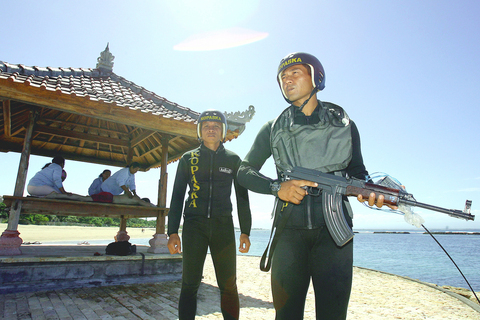The standoff over Iran's nuclear ambitions overshadowed trade talks opening on Bali yesterday between leaders of Muslim-majority countries, with snipers on rooftops, anti-terror squads patrolling the resort and security posts on the beach.
Iranian President Mahmoud Ahmadinejad met with his Indonesian counterpart Susilo Bambang Yudhoyono and Pakistani Prime Minister Shaukat Aziz to discuss ways to boost economic and political cooperation, alleviate poverty, restructure debt and develop alternative energy sources.
Heads of state from Nigeria, Turkey and Malaysia and government ministers from Egypt and Bangladesh also took part in the daylong Developing Eight (D-8) summit on Indonesia's tropical Bali island, which has in recent years been hit by a series of al-Qaeda-linked terrorist attacks.

PHOTO: AFP
Though the crisis over Iran's nuclear ambitions was not officially on the agenda, Ahmadinejad sought support from his Islamic brothers on the sidelines.
He says his country's nuclear program was only aimed at generating energy, but Washington believes the real purpose is to build weapons.
Malaysian Foreign Minister Syed Hamid Albar said after holding a hastily arranged meeting with the Iranian leader that he supported a diplomatic solution to the crisis.
"Dialogue is the best way," he told reporters before slipping back into the main conference room. "We should not create another crisis."
Fears that Iran was trying to build nuclear warheads were aggravated on Friday, when diplomats said UN inspectors may have found traces of highly enriched weapons-grade uranium on equipment from an Iranian research center linked to the military.
The diplomats, who demanded anonymity in exchange for divulging the confidential information, cautioned that they were still awaiting confirmation from other laboratory tests.
Ahmadinejad vowed to continue to battle against the West for the right to develop new technologies, saying it is every country's right and in the interests of the D-8, which represent 14 percent of the world's population.
The meeting on Bali occurred eight months after suicide bombers walked into three crowded restaurants, killing 20 people.
The deadly strike blamed on the Jemaah Islamiyah terror network, followed twin nightclub bombings in 2002 that killed 202 mostly foreign tourists.
Security was tight, with snipers stationed on rooftops and the top floor of the five-star beach-side hotel that was hosting the meeting
Bags were X-rayed, anti-terror police dressed in black patrolled the grounds, and makeshift military posts were stationed along the beach.

Auschwitz survivor Eva Schloss, the stepsister of teenage diarist Anne Frank and a tireless educator about the horrors of the Holocaust, has died. She was 96. The Anne Frank Trust UK, of which Schloss was honorary president, said she died on Saturday in London, where she lived. Britain’s King Charles III said he was “privileged and proud” to have known Schloss, who cofounded the charitable trust to help young people challenge prejudice. “The horrors that she endured as a young woman are impossible to comprehend and yet she devoted the rest of her life to overcoming hatred and prejudice, promoting kindness, courage, understanding

Tens of thousands of Filipino Catholics yesterday twirled white cloths and chanted “Viva, viva,” as a centuries-old statue of Jesus Christ was paraded through the streets of Manila in the nation’s biggest annual religious event. The day-long procession began before dawn, with barefoot volunteers pulling the heavy carriage through narrow streets where the devout waited in hopes of touching the icon, believed to hold miraculous powers. Thousands of police were deployed to manage crowds that officials believe could number in the millions by the time the statue reaches its home in central Manila’s Quiapo church around midnight. More than 800 people had sought

‘DISRESPECTFUL’: Katie Miller, the wife of Trump’s most influential adviser, drew ire by posting an image of Greenland in the colors of the US flag, captioning it ‘SOON’ US President Donald Trump on Sunday doubled down on his claim that Greenland should become part of the US, despite calls by the Danish prime minister to stop “threatening” the territory. Washington’s military intervention in Venezuela has reignited fears for Greenland, which Trump has repeatedly said he wants to annex, given its strategic location in the arctic. While aboard Air Force One en route to Washington, Trump reiterated the goal. “We need Greenland from the standpoint of national security, and Denmark is not going to be able to do it,” he said in response to a reporter’s question. “We’ll worry about Greenland in

PERILOUS JOURNEY: Over just a matter of days last month, about 1,600 Afghans who were at risk of perishing due to the cold weather were rescued in the mountains Habibullah set off from his home in western Afghanistan determined to find work in Iran, only for the 15-year-old to freeze to death while walking across the mountainous frontier. “He was forced to go, to bring food for the family,” his mother, Mah Jan, said at her mud home in Ghunjan village. “We have no food to eat, we have no clothes to wear. The house in which I live has no electricity, no water. I have no proper window, nothing to burn for heating,” she added, clutching a photograph of her son. Habibullah was one of at least 18 migrants who died